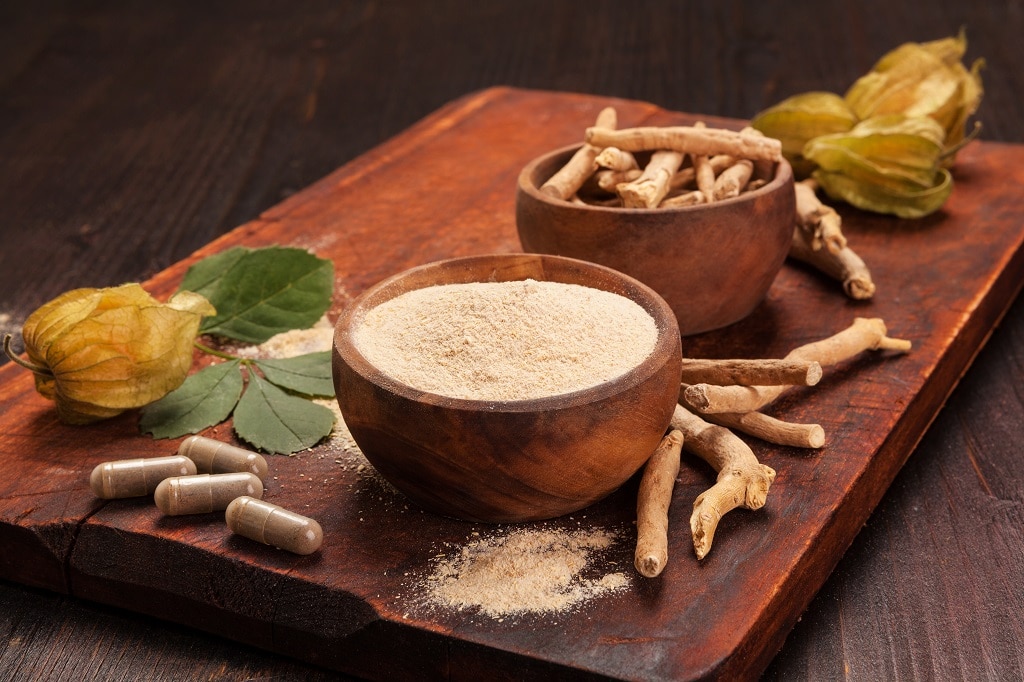
10 Foods That Help Fight Fatigue
We are big fans of the “eat the rainbow” approach to healthy eating. The colorful fruits, vegetables and legumes that are part of this group
Did you know that ashwagandha contains compounds that may reduce stress, anxiety, and inflammation?
It feels like there’s always something new to try in the wellness world. Sometimes it’s a new buzzword or crazy-sounding supplement. There’s a lot of hype behind ashwagandha. But the herb isn’t new at all; you can actually trace it back thousands of years. It was a potent herb for rejuvenating health and boosting lifespan even back then. Read on to find out when to take ashwagandha for its health benefits and the best way to incorporate the herb into your routine.
Ashwagandha (Withania somnifera) is an ancient medicinal herb found in Africa, India, and parts of the Middle East. The evergreen shrub is also known as:
Practitioners of Ayurvedic medicine use ashwagandha to increase energy, improve health, and reduce inflammation and pain. Ayurvedic medicine is the traditional medicine system in India. It uses a careful combination of herbs, meditation, nutrition, and movement to create balance and harmony within the body and mind.
Ashwagandha is known for being a powerful and medicinal herb that spans back thousands of years. It’s also thought to be an adaptogen, a herb that can help the body cope with stress.
As more people look to a natural approach to manage stress and find calm, ashwagandha is increasing in popularity. While it’s good to discuss any change in supplements with your healthcare provider, here are some research-backed ashwagandha benefits to explore.
Nearly eight in ten Americans feel stressed weekly. Despite every effort to reduce feelings of worry, many learn to tolerate stress. While it can sometimes feel impossible to avoid stress and anxiety altogether, finding a way to reduce and manage it is crucial to your well-being.
Ashwagandha is most known for its stress-busting properties. As a potential adaptogen, it’s a substance that may help the body cope with stress.
Adaptogens support the physiological stress response. The theory behind it is that they stimulate your body’s stress response to help you achieve a state of homeostasis. Homeostasis is from the Greek words for “steady” and “same.”
Essentially, anything that promotes homeostasis brings your body back to a place for optimal survival. For instance, your core body temperature and blood glucose are examples of homeostasis.
While this sounds very promising, more research is needed to understand the exact way these powerful herbs can impact the complex systems in the body.
A growing body of research suggests that ashwagandha is beneficial for stress and anxiety. One study found that after taking ashwagandha for eight weeks, participants had lower levels of the stress hormone cortisol. They also noticed improvements in sleep quality.
Ashwagandha may help improve symptoms of depression. One study found that after 60 days of taking ashwagandha, stressed adults noticed a 77% reduction in depression symptoms.
While more studies are needed to understand the precise mechanisms of ashwagandha on mental health issues like depression, it’s another promising area.
Lab studies suggest that ashwagandha can enhance cognitive function by promoting neuronal growth. It may even protect neurons from oxidative stress, but more research is needed to confirm the effect in humans.
One study found that after 14 days of taking ashwagandha, reaction times significantly improved across almost all tests.
Ashwagandha has anti-inflammatory properties that may help to lower inflammation and fight infection. Withaferin A (WA) is a natural compound from Withania somnifera and could be a promising anti-cancer and anti-inflammatory compound. Early studies suggest that it can suppress inflammatory diseases in diabetes, obesity, and cystic fibrosis.
Ashwagandha benefits for females may surprise you. As a herb known for its ability to reduce stress and make you feel calmer, it may also increase blood flow and sexual function. One pilot study shows that ashwagandha root extract improves sexual dysfunction in women.
Ashwagandha may help you sleep better due to the way it soothes stress. There are several compounds in ashwagandha that may be responsible for its sleep-inducing effects. As stress can lead to poor sleep, ashwagandha may promote sleep by helping the body to manage stress. One study found that ashwagandha root extract improves sleep quality in patients with insomnia.
Ashwagandha is usually well-tolerated by most people in typical dosages. But like any supplements or herbs, some mild to moderate side effects occur during clinical studies, including:
In very rare cases, some users report:
Taking large amounts of ashwagandha may lead to stomach upset, diarrhea, vomiting, and nausea. While ashwagandha is considered safe, certain individuals should be careful, including:
Ashwagandha is also part of the nightshade family. So, if you follow a diet that eliminates nightshade foods (tomatoes, peppers, potatoes, etc.), it’s best to avoid ashwagandha altogether. Think of it as a distant cousin to peppers and tomatoes.
If you’re considering adding any supplement to your routine, it’s important to consult your doctor, especially if you are taking medication. Not enough research is available on ashwagandha for pregnant or breastfeeding women, so it’s best to avoid it.
You might be wondering when is the best time to take ashwagandha. Well, the best time of day to take ashwagandha depends on a few things. The reason why you’re taking will influence when to take it. You can take ashwagandha at night and during the day. The right time will depend on your personal preferences and how you tolerate the herb.
The best time to take ashwagandha for sleep is just before bed. Initial research shows that ashwagandha may help you fall asleep more quickly, stay asleep for longer and improve overall sleep quality. One study reports that participants had a 72% increase in sleep quality after taking ashwagandha for six weeks.
Taking ashwagandha before bed appears to be optimal to experience its sleep benefits. Because the plant may help your body cope with stress, taking it at night helps calm and relax the nervous system.
Should you take ashwagandha on an empty stomach? Or maybe wait until after your first meal to start your supplement regime? You can take ashwagandha on both an empty stomach and after a meal. But if you find that you experience some stomach upset when taking it, you may wish to take it after a meal or at night.
You can take ashwagandha after breakfast, lunch, dinner, or a small snack. How your body responds will play a part in whether you decide to take ashwagandha before or after a meal.
So, should you take ashwagandha in the morning or night? Like any supplement regime, consistency is key. If you’re looking to reduce stress and anxiety and take your supplements in the morning, it makes sense to add ashwagandha to the mix and stick to your regular routine. But if you find that taking it on an empty stomach doesn’t work for you, wait until after breakfast. You can also add ashwagandha powder to a smoothie.
For those more susceptible to stomach upsets, taking ashwagandha at night may be a better option. If you’re taking the herb for sleep, then adding it to your nighttime routine is a great place to start.
If you’re looking for the best way to take ashwagandha, you’re in the right place. You can take ashwagandha in the following forms:
The most common ways to take ashwagandha are either capsules or powder. Dosages can range massively depending on the brand. As different studies use varying dosages, some evidence suggests that taking 250–600 mg per day is ideal for stress. Others report using a higher dosage.
Because the dosage can change in capsules and powders, it’s essential to follow instructions on the packaging. Before taking any new herbal supplement, it’s best to consult your healthcare professional for advice on dosage.
If you prefer taking supplements as capsules, you usually have to take one to two capsules per day, depending on the guidelines and dosage.
Taking ashwagandha powder is one of the most popular ways to consume the ancient herb. As a powder, you can add ashwagandha to lots of different drinks and foods to keep it exciting. On its own, ashwagandha can have quite an earthy, bitter taste.
Here’s how to take ashwagandha powder with water:
You can also add ashwagandha powder to the following:
By adding ashwagandha powder to your favorite beverage or breakfast, it’s easy to add it to your routine. To reap the benefits consistently is so important. Make it super simple to take ashwagandha so that it becomes a part of your everyday life.
The effects of ashwagandha are not immediate. There is no overnight cure for stress, sleep issues, or brain fog. Instead, it takes a little while to experience the effects of ashwagandha.
Several studies show that you can take ashwagandha during the day or night. Some people experience improvements in sleep in as little as six weeks. Here’s what the research says.
A recent study shows that sleep quality improved after six weeks of taking 120mg of ashwagandha two hours before bed.
Another study evaluated the effects of ashwagandha on stress and sleep. Scientists found that eight weeks of taking 125-300mg of ashwagandha twice a day reduces stress while improving sleep quality.
A 300-milligram dose of ashwagandha twice a day for twelve weeks improved mental alertness and sleep quality in older adults. That’s not to say it can only take twelve weeks for ashwagandha to work. It’s not an immediate effect. It could take days or weeks to see the difference. That’s why it is crucial to stick to your supplement routine to reap the most benefits.
The time it takes for ashwagandha to work really depends on the person too. It’s important that you always stick to the recommended dosage, even if it’s taking a little longer to feel the benefits.
The Personal Nature Anti-Inflammatory Blend uses sustainably crafted and potent ingredients to reduce inflammation. Alongside ashwagandha, the powerful blend includes:
With a combination of superfoods known for their anti-inflammatory properties, the blend uses personalized, scientifically proven mixes. Every blend is meticulously weighed and mixed to order. Simply add one teaspoon of the Anti-Inflammatory Blend to your favorite beverage or breakfast to feel the benefits.
Naturally sweet with no added sugar, you can add the blend to lattes, chai, smoothies, and more. Incorporate the powder into your everyday meals to experience the benefits.
How and when to take ashwagandha to reap its health benefits depends on the purpose of taking it in the first place. The best way to experience the benefits is to use it in a way that’s straightforward and entirely manageable for you. That’s why powders and blends are a popular addition to a supplement regimen.
As more people look to reduce stress and improve sleep using a natural approach, nutrition and what you eat have so much influence over your well-being. Ashwagandha is an ancient herb known for its anti-inflammatory and stress-busting properties. The best time to take ashwagandha is a personal choice. So, listen to your body and give yourself the opportunity to remain consistent.

We are big fans of the “eat the rainbow” approach to healthy eating. The colorful fruits, vegetables and legumes that are part of this group

Many people start to think more about joint health as they get older. Knees get a little achy, and you become much more aware of

Have you ever set a pretty out-there nutrition or weight loss goal only to be disappointed? Sometimes, it can feel like you’re not getting anywhere

Did you know that many women experience more joint and muscle pain around the time of menopause? As if menopause wasn’t a challenging enough time

Did you know that ashwagandha contains compounds that may reduce stress, anxiety, and inflammation? It feels like there’s always something new to try in the
*The statements on this website have not been evaluated by the Food and Drug Administration. The products for sale are not intended to diagnose, treat, cure, or prevent any disease.